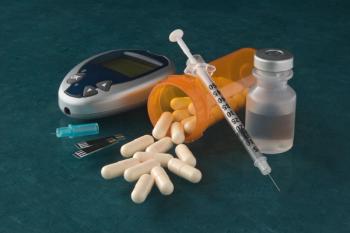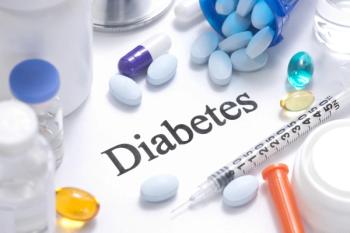
Diabetes
Latest News


Empagliflozin Meets Primary End Point for Heart Failure With Reduced Ejection Fraction
Latest Videos

CME Content
More News

The orders President Trump signed Friday include a deadline for the pharmaceutical industry to come up with their own plan by August 24 to lower prices.

IQVIA, a health information technology and clinical research company, recently announced a new collaboration with JDRF, the world’s largest nonprofit funder of type 1 diabetes (T1D) research. Together, the companies plan to develop a real-world research platform to facilitate evidence generation for T1D via non-identified patient-level data and analytics.

Children with type 1 diabetes (T1D) have a less desirable gut microbiome composition, potentially contributing to the development of the disease, according to new research published in the Journal of Clinical Endocrinology & Metabolism.

Even in individuals who don't have diabetes, hyperglycemia is an independent risk factor for COVID-19 mortality after 28 days of hospitalization, according to a study published in Diabetolgia.

The authors report the experience of one of the first Southern US communities to develop a comprehensive health care data repository for tracking processes and outcomes of care and identifying areas of greatest need.

California Governor Gavin Newsom announced yesterday the closure of indoor facilities statewide, amid a resurgence of coronavirus disease 2019 cases; US District Judge Theodore Chuang waived the in-person visit requirement to a hospital, clinic, or medical office to receive an abortion pill, due to the pandemic; a diet high in fruits and vegetables may halve the risk of developing type 2 diabetes.

In individuals with type 2 diabetes (T2D), sleep problems are associated with disturbances in cortisol responses to stress, in addition to changes in diurnal cortisol output, according to a study published in Psychoneuroendocrinology.

Heart failure yields the greatest 5-year mortality risk for individuals newly diagnosed with type 2 diabetes (T2D) compared with any other heart or kidney diseases, according to a study published in Circulation: Cardiovascular Quality and Outcomes.

Individuals living with type 1 and type 2 diabetes (T1D and T2D, respectively) are at greater risk of bone fractures, according to a systematic review update published in Bone.

Amid progress in diabetes treatments and technology, the rate of amputations rose 50% between 2009 and 2015. African American patients lose limbs at triple the rate of other groups. The mission of the Affordable Care Act—spend more to prevent disease and complications, and save money later—has bypassed many of these patients for one reason: they lack access to care.

This article addresses what employers need to know about food as medicine and offers practical steps to reduce barriers for their employee populations.

The coronavirus disease 2019 (COVID-19) pandemic will hopefully be a wakeup call to take diabetes more seriously and to work to prevent diabetes and its complications, said Robert Gabbay, MD, PhD, chief medical and scientific officer of the American Diabetes Association.

Metformin-based therapy may be an optimal first-line treatment for patients with type 2 diabetes (T2D) and low cardiovascular risk, according to a systematic review and network meta-analysis published in Annals of Internal Medicine.

Peer support is a huge advantage of technological health interventions for teens with type 1 diabetes (T1D), while integrating technology with physical activities is important when promoting healthy lifestyles, said Tara Kaushal, MD, physician and clinical researcher at Joslin Diabetes Center.

Among Medicare enrollees, there was substantial between-practice variation in the use of second-generation diabetes drugs between 2007 and 2015, according to a study published in JAMA Network Open. Data also revealed a concentration of use among a few prescribers and practices, who were responsible for widespread early diffusion.

Every week, The American Journal of Managed Care® recaps the top managed care news of the week, and you can now listen to it on our podcast, Managed Care Cast.

A look at the Diabetes Prevention Program at the 10-year mark showed the program brought lasting results.

Coverage of our peer-reviewed research and news reporting in the healthcare and mainstream press.

This week, the top managed care news included more details about the COVID-19 vaccine process; attempts to reinforce social distancing amid reopening; a recap of the American Diabetes Association 2020 Virtual Scientific Sessions.

Jennifer N. Clements, PharmD, is a clinical pharmacist in diabetes transition with Spartanburg Regional Healthcare System in Spartanburg, South Carolina. Clements is a board-certified pharmacotherapy specialist, board-certified ambulatory care pharmacist, and certified diabetes care and education specialist. She is currently developing a pharmacy service focused on the inpatient management of diabetes. An editor from The American Journal of Managed Care® recently conducted an interview with Clements to discuss strategies for improving transitions of care for patients with diabetes.

New results from the Diabetes Prevention Program Outcomes Study (DPPOS), presented at the American Diabetes Association’s 80th Scientific Sessions, showed persistent reductions in type 2 diabetes (T2D) development over an average 22-year follow-up period.

A finding that ertugliflozin produced a 30% drop in heart failure hospitalization risk fell outside the study’s primary and secondary end points; here, the drug performed within range of its class, the sodium glucose co-transporter 2 (SGLT2) inhibitors.

Research presented at the American Diabetes Association's 80th Scientific Sessions offers new insights into the future of glycemic control, diabetes self-management, and remote care.

In this episode of Managed Care Cast, we speak with the lead author of a study in the June issue of The American Journal of Managed Care® about the nationwide dearth of suppliers of the Medicare Diabetes Prevention Program, which aims to reach older adults with prediabetes.

Selected abstracts from the American Diabetes Association's 80th Scientific Sessions discuss when to add injectable therapy, how patients who switched to semaglutide lost more weight and gained glycemic control, and offered results from an early-phase study on a monoclonal antibody that may preserve B-cell function.
















